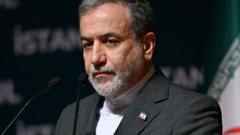President Trump faces a pivotal moment in Iran negotiations, mirroring challenges faced by past administrations regarding nuclear fuel production and the risk of conflict.**
Trump's Dilemma: Navigating Iran's Nuclear Ambitions**

Trump's Dilemma: Navigating Iran's Nuclear Ambitions**
The U.S. administration grapples with the complex challenges of negotiating with Iran amid fears of nuclear escalation.**
The ongoing negotiations between President Trump's team and Iran highlight a significant dilemma: whether the U.S. should tolerate Iran's continued production of nuclear fuel to avert a potential war in the Middle East. Trump's special envoy, Steve Witkoff, is navigating these negotiations, which have become increasingly complicated as Iran firmly asserts its right to enrich uranium on its territory.
This situation bears a striking resemblance to the challenges former President Barack Obama encountered nearly a decade ago. Obama and his administration ultimately reached the conclusion that any viable agreement would necessitate permitting Iran to produce a limited quantity of nuclear fuel, keeping their centrifuges operational and enabling their scientists to continue their work. This accord sparked fierce debate in the U.S. Congress, garnering opposition from all Republicans and some Democrats before Trump exited the deal, claiming Iran was initially in compliance with its terms.
Now, Trump finds himself revisiting the precarious options that Obama faced, all while likely contending with opposition from hardliners in the U.S., as well as from Israeli Prime Minister Benjamin Netanyahu, who has aggressively advocated for preemptive military action against Iran's nuclear facilities. Wendy Sherman, who was integral to the Obama-era negotiations, notes the cyclical nature of U.S. foreign policy in this case. She emphasizes that there are many lawmakers and officials advocating for the total dismantlement of Iran's nuclear capabilities and prohibiting any level of enrichment, echoing the very same challenges that surfaced during past negotiations.




















